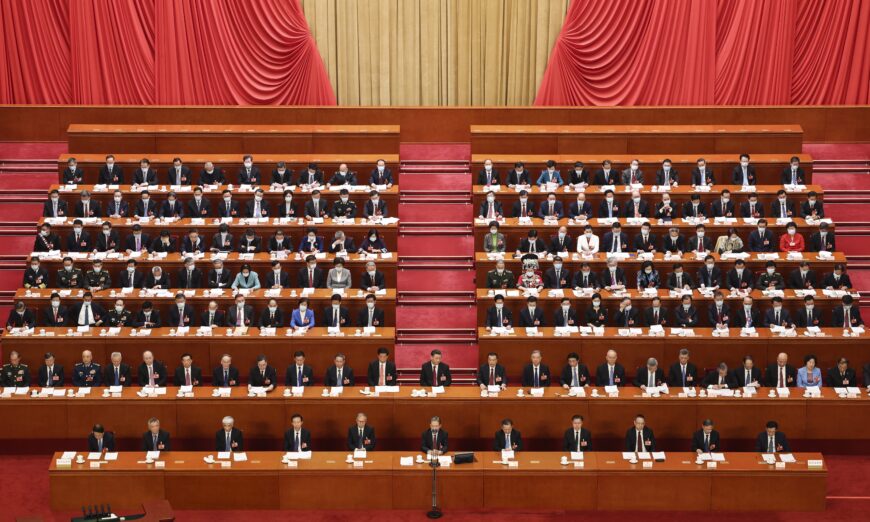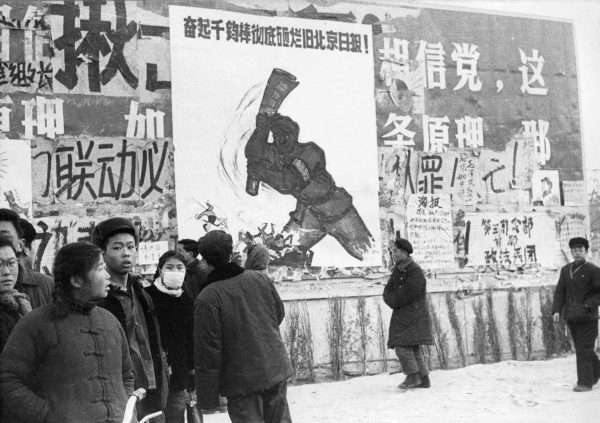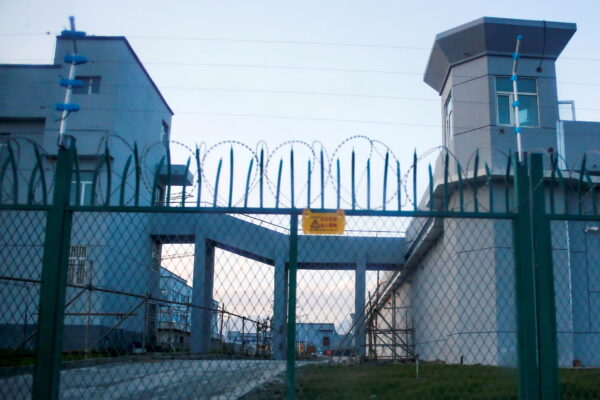The CCP Cannot Be Trusted
Commentary The communist Chinese are full of advice. After all, Xi Jinping aspires to become the world’s hegemon and probably believes and expects others to rightfully do what he and his fellow communist apparatchiks preach—no matter the consequences. That was the approach that Mao Zedong used: dream up a crackpot economic, social, or political policy and then force people to comply despite the costs and damage to Chinese society and people. This is because the Chinese Communist Party (CCP) believes itself to be omniscient and the natural ruler of China (and the world). Never mind its utter arbitrariness and willingness to sacrifice millions of lives to achieve its political ends, especially retaining power and control over the Chinese people. Doing the opposite of what Beijing says would serve China and the world better than acquiescing to the CCP’s diktats on every aspect of human endeavors. After all, its failures over time have earned our scorn and condemnation. Let us examine the issue further. Past Transgressions The Great Leap Forward (1958 to 1960) This was Mao’s signature policy aimed at completely reorganizing Chinese society by creating large-scale rural communes to alleviate perennial food security problems and labor-intensive industries that emphasized manpower instead of machines, automation, and the associated capital expenditures needed to develop modern production capabilities. This anti-capitalist initiative resulted in at least 45 million deaths during the associated Great Famine while delaying the modernization of Chinese industries for years and creating an insatiable demand for slave labor for the factories. The Leap abruptly ended as capitalist methods were quietly introduced in the countryside, boosting agricultural production over time. Neither the Great Helmsman Mao nor his executioners ever admitted their errors in foisting this disaster on the Chinese people. A small group of Chinese youths walks past several dazibaos, the revolutionary placards, during the “Great Proletarian Cultural Revolution,” in Beijing, on February 1967. (Jean Vincent/AFP/Getty Images) The Great Proletarian Cultural Revolution (1966-1976) Apparently believing the Chinese Marxist revolution was losing steam at least partly due to corruption, Mao directed zealous Chinese youths to purge impure elements within Chinese society and reinvigorate the Marxist enthusiasm that led to the People’s Liberation Army’s triumph over the Nationalists in 1949. This led to the formation of paramilitary groups called the Red Guards that attacked members of China’s elderly and intellectual population, as well as the development of a personality cult around Mao that plagues China today. The result was an estimated 1.5 million deaths plus the banishment of 20 million others. There has never been an acknowledgment by the CCP of the horrors perpetrated during the Cultural Revolution because any such official statement would be an admission of the fallibility of the regime and lead to a delegitimization of the CCP’s historical claim to political power. The Laogai/Laojiao Reeducations Camps (1950-present) After the communists seized power in 1949, people deemed enemies of the CCP were “processed” in various camps in the Chinese version of the Soviet Union’s gulag system. Targeted initially at the intelligentsia, Nationalists and their supporters, and “capitalist roaders,” the system morphed over the years to accommodate the genocide of Tibetans, Uyghurs, Falun Gong adherents, and other Chinese racial and religious minority groups. These camps were the dumping ground for political and ideological enemies of the CCP over the years. Over 50 million people spent time in these hellholes from circa 1950 through the present. That the camps are still in operation today makes a lie of virtually every altruistic and humanitarian pronouncement of the communist regime in Beijing. The above has been dismissed as “ancient history,” “past excesses from a cruder era,” and “just statistics” in the grand scheme of things by those who support continuing engagement with China at any cost. Are such people Marxists, fellow travelers, or the Devil’s disciples? A perimeter fence surrounds a forced reeducation center in Dabancheng, Xinjiang region, China, on Sept. 4, 2018. (Thomas Peter/Reuters) The sacrifice of the lives and freedoms of innocent people to achieve the CCP’s goals is unconscionable. Yet we are encouraged to believe the utterances of the modern, erudite, and well-read Xi (who wears his Marxism on his sleeve and exercises his power and authority without regard to the adverse impact on Chinese citizens). A perfect example is his signature “zero-COVID” policy, which echoes the disasters wrought by Mao. COVID-19 Pandemic The first COVID cases were found in Wuhan in the fall of 2019 and promptly covered up by the Beijing regime. Cynically, state-run Chinese media began a relentless campaign conveying the CCP narrative on the

Commentary
The communist Chinese are full of advice. After all, Xi Jinping aspires to become the world’s hegemon and probably believes and expects others to rightfully do what he and his fellow communist apparatchiks preach—no matter the consequences.
That was the approach that Mao Zedong used: dream up a crackpot economic, social, or political policy and then force people to comply despite the costs and damage to Chinese society and people. This is because the Chinese Communist Party (CCP) believes itself to be omniscient and the natural ruler of China (and the world). Never mind its utter arbitrariness and willingness to sacrifice millions of lives to achieve its political ends, especially retaining power and control over the Chinese people.
Doing the opposite of what Beijing says would serve China and the world better than acquiescing to the CCP’s diktats on every aspect of human endeavors. After all, its failures over time have earned our scorn and condemnation.
Let us examine the issue further.
Past Transgressions
The Great Leap Forward (1958 to 1960)
This was Mao’s signature policy aimed at completely reorganizing Chinese society by creating large-scale rural communes to alleviate perennial food security problems and labor-intensive industries that emphasized manpower instead of machines, automation, and the associated capital expenditures needed to develop modern production capabilities.
This anti-capitalist initiative resulted in at least 45 million deaths during the associated Great Famine while delaying the modernization of Chinese industries for years and creating an insatiable demand for slave labor for the factories. The Leap abruptly ended as capitalist methods were quietly introduced in the countryside, boosting agricultural production over time. Neither the Great Helmsman Mao nor his executioners ever admitted their errors in foisting this disaster on the Chinese people.

The Great Proletarian Cultural Revolution (1966-1976)
Apparently believing the Chinese Marxist revolution was losing steam at least partly due to corruption, Mao directed zealous Chinese youths to purge impure elements within Chinese society and reinvigorate the Marxist enthusiasm that led to the People’s Liberation Army’s triumph over the Nationalists in 1949.
This led to the formation of paramilitary groups called the Red Guards that attacked members of China’s elderly and intellectual population, as well as the development of a personality cult around Mao that plagues China today. The result was an estimated 1.5 million deaths plus the banishment of 20 million others.
There has never been an acknowledgment by the CCP of the horrors perpetrated during the Cultural Revolution because any such official statement would be an admission of the fallibility of the regime and lead to a delegitimization of the CCP’s historical claim to political power.
The Laogai/Laojiao Reeducations Camps (1950-present)
After the communists seized power in 1949, people deemed enemies of the CCP were “processed” in various camps in the Chinese version of the Soviet Union’s gulag system. Targeted initially at the intelligentsia, Nationalists and their supporters, and “capitalist roaders,” the system morphed over the years to accommodate the genocide of Tibetans, Uyghurs, Falun Gong adherents, and other Chinese racial and religious minority groups.
These camps were the dumping ground for political and ideological enemies of the CCP over the years. Over 50 million people spent time in these hellholes from circa 1950 through the present. That the camps are still in operation today makes a lie of virtually every altruistic and humanitarian pronouncement of the communist regime in Beijing.
The above has been dismissed as “ancient history,” “past excesses from a cruder era,” and “just statistics” in the grand scheme of things by those who support continuing engagement with China at any cost. Are such people Marxists, fellow travelers, or the Devil’s disciples?

The sacrifice of the lives and freedoms of innocent people to achieve the CCP’s goals is unconscionable. Yet we are encouraged to believe the utterances of the modern, erudite, and well-read Xi (who wears his Marxism on his sleeve and exercises his power and authority without regard to the adverse impact on Chinese citizens).
A perfect example is his signature “zero-COVID” policy, which echoes the disasters wrought by Mao.
COVID-19 Pandemic
The first COVID cases were found in Wuhan in the fall of 2019 and promptly covered up by the Beijing regime. Cynically, state-run Chinese media began a relentless campaign conveying the CCP narrative on the pandemic, including the supposed benefits to China and the world of Xi’s “zero-COVID” policy, the alleged beneficence of China in providing medical supplies and vaccines to other countries, and the countering of news reports in foreign media that exposed the truth about the virus origins and Chinese intransigence in sharing critical virus-related information with the world’s medical and scientific communities. The draconian COVID-19 policy amounted to a nearly three-year crackdown on the movement of individual Chinese that depressed the Chinese export economy and resulted in an unknown number of deaths.
And like Mao, Xi reversed course without any admission of failure or contrition for the damage wrought on Chinese society by his unscientific zero-COVID lockdowns.
Concluding Thoughts
It’s better to believe and do the opposite of what Xi and the CCP preach. For example:
The Chinese foreign minister’s admonition that the United States not enter into regional alliances to thwart China (which is absolutely the right course of action to counter Chinese military belligerence such as this recent episode in the Taiwan Strait).
Xi’s recent declaration reaffirming “his fixation on ideological control at the expense of economic growth” (yeah, that’s just what the Chinese people need at this juncture: sacrificing their economic well-being on the throne of Marxist ideology).
Xi expressed the need for “effective auditing work to serve the overall development of the Party and State” (he is advocating either more regulatory oversight or cooking the books to convince outsiders of the robustness of the Chinese economy in lieu of productivity enhancements).
Then there is the furtherance of Xi’s cult of personality—“the campaign to study and implement Xi Jinping Thought on Socialism with Chinese Characteristics for a New Era” (a complete distraction from the socio-economic problems foisted on the Chinese people by the CCP).
Lastly, there is this “Xi quote”: “Work is the source of all happiness” (tell that to the Uyghurs working for slave wages in the camps in Xinjiang).
Why should anyone trust the CCP, given its track record?
Views expressed in this article are the opinions of the author and do not necessarily reflect the views of The Epoch Times.












